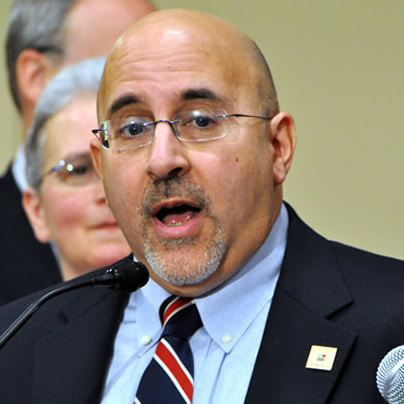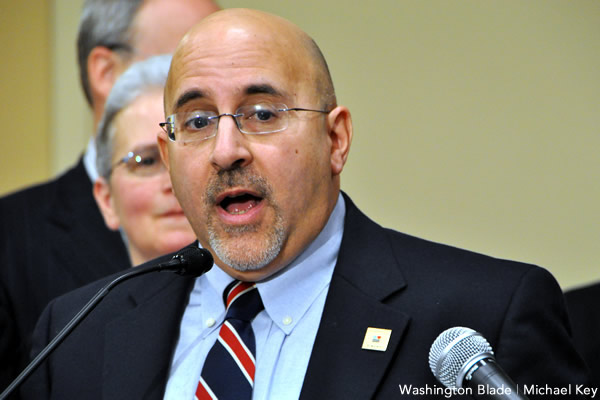Politics
Marriage advocate to speak out for LGBT workers
Wolfson among speakers for Freedom to Work’s premier ‘Situation Room’


Freedom to Marry President Evan Wolfson is set to speak at Freedom to Work’s “Situation Room” (Washington Blade file photo by Michael Key)
A longtime LGBT advocate at the forefront of the movement to advance marriage equality may take a slightly different tune on Thursday when he’s set to speak out on ways to advance LGBT workplace non-discrimination protections.
Evan Wolfson, president of Freedom to Marry, is scheduled to be among the speakers at Freedom to Work’s premier “Situation Room” in New York City at New York Law School — the first in a series of public forums to strategize on the way forward for the Employment Non-Discrimination Act.
Wolfson told the Washington Blade he envisions that his participation will facilitate a discussion on the ways successes from the marriage equality movement can be applied to ENDA.
“It’s going to really be more of a conversation about what are some of the lessons that we applied from history and from other movements in the shaping our strategy and campaign to bring the freedom to marry to the United States, and how can we apply some of those in the work to end employment discrimination,” Wolfson said.
The cross-pollination of the marriage equality strategy to other movements isn’t new for Wolfson, who said he’s been asked by other campaigns — ranging from the environment to voting rights efforts — to talk about the ways in which marriage equality achievements can be applied to these initiatives.
Although he’s credited with being a founder of the marriage equality movement, Wolfson is no stranger to advocating on behalf of other LGBT causes. In 2000, he argued before the U.S. Supreme Court that a New Jersey law prohibiting the Boy Scouts of America from banning gay scouts was constitutional. The court ultimately ruled the other way.
Other LGBT causes in which Wolfson said he’s been involved are employment cases, work to abolish state sodomy laws as well as protections for people with HIV/AIDS.
“In all my years working in our movement, I’ve never really been a fan of pitting one so-called issue against the other,” Wolfson said. “To my mind, marriage has never been just about marriage. Marriage has been a powerful vocabulary of helping people understand who we are as LGBT people and to tap into their values of fairness and respect and help them move.”
After talking on this initial panel, Wolfson said he’ll speak out to aid LGBT workplace non-discrimination efforts “where it can be appropriate and helpful,” but added he has no immediate plans to do so.
“Obviously, my primary mission right now is continue leading the campaign to win the freedom to marry, and I want to finish the job, and we are not done,” Wolfson said.
Freedom to Work President Tico Almeida first announced the “Situation Room” in July as a way for groups working on federal workplace non-discrimination protections to lay out their contributions to the effort.
Wolfson is set to speak on a second panel as part of the “Situation Room” alongside Almeida in a session titled, “Lessons from Freedom to Marry for the Campaign to Win the Freedom to Work,” according to a statement from Freedom to Work.
Another panel earlier in the day is set to consist of Brad Sears, executive director of the Williams Institute at the University of California, Los Angeles, as well as two LGBT advocates representing both major political parties: Gregory Angelo, executive director of the National Log Cabin Republicans; and Melissa Sklarz, president of Stonewall Democrats of New York City.
In a statement, Almeida billed the “Situation Room” as a bipartisan event said it would help lead to victory for ENDA on the Senate floor, where a vote is expected to take place later this year.
“We’re honored to host a bipartisan group of leading experts and advocates for this first of a kind ENDA event,” Almeida said. “I’m confident we’re going to win a big Senate victory this year, and then ride that momentum into a robust campaign in the House of Representatives.”
The program, which is scheduled to begin Thursday at 2 pm, is set to be webcast live at the LGBT blog Towleroad.com. Moderating the first panel will be Towelroad legal editor and New York Law School professor Ari Ezra Waldman of New York Law School.
Almeida declined to comment on who’s set to moderate the second panel with Wolfson, but added additional speakers will be named later in the week.
A second ENDA “Situation Room” is planned later for Miami, which Almeida said will include Spanish-language content for Latino voters. Depending the timing of the ENDA Senate vote, similar events may place in Phoenix, Las Vegas and Philadelphia.
“Given where the undecided senators reside in states like Arizona, Nevada, and Florida, we believe Latino voters are a critical part of any winning ENDA coalition,” Almeida concluded.
Congress
Congress passes ‘Big, Beautiful Bill’ with massive cuts to health insurance coverage
Roughly 1.8 million LGBTQ Americans rely on Medicaid

The “Big, Beautiful Bill” heads to President Donald Trump’s desk following the vote by the Republican majority in the U.S. House of Representatives Thursday, which saw two nays from GOP members and unified opposition from the entire Democratic caucus.
To partially offset the cost of tax breaks that disproportionately favor the wealthy, the bill contains massive cuts to Medicaid and social safety net programs like food assistance for the poor while adding a projected $3.3 billion to the deficit.
Policy wise, the signature legislation of Trump’s second term rolls back clean energy tax credits passed under the Biden-Harris administration while beefing up funding for defense and border security.
Roughly 13 percent of LGBTQ adults in the U.S., about 1.8 million people, rely on Medicaid as their primary health insurer, compared to seven percent of non-LGBTQ adults, according to the UCLA School of Law’s Williams Institute think tank on sexual orientation and gender identities.
In total, the Congressional Budget Office estimates the cuts will cause more than 10 million Americans to lose their coverage under Medicaid and anywhere from three to five million to lose their care under Affordable Care Act marketplace plans.
A number of Republicans in the House and Senate opposed the bill reasoning that they might face political consequences for taking away access to healthcare for, particularly, low-income Americans who rely on Medicaid. Poorer voters flocked to Trump in last year’s presidential election, exit polls show.
A provision that would have blocked the use of federal funds to reimburse medical care for transgender youth was blocked by the Senate Parliamentarian and ultimately struck from the legislation — reportedly after the first trans member of Congress, U.S. Rep. Sarah McBride (D-Del.) and the first lesbian U.S. senator, Tammy Baldwin (D-Wis.), shored up unified opposition to the proposal among Congressional Democrats.
Congress
Ritchie Torres says he is unlikely to run for NY governor
One poll showed gay Democratic congressman nearly tied with Kathy Hochul

Gay Democratic Congressman Ritchie Torres of New York is unlikely to challenge New York Gov. Kathy Hochul (D) in the state’s next gubernatorial race, he said during an appearance Wednesday on MSNBC’s “Morning Joe.”
“I’m unlikely to run for governor,” he said. ““I feel like the assault that we’ve seen on the social safety net in the Bronx is so unprecedented. It’s so overwhelming that I’m going to keep my focus on Washington, D.C.”
Torres and Hochul were nearly tied in a poll this spring of likely Democratic voters in New York City, fueling speculation that the congressman might run. A Siena College poll, however, found Hochul leading with a wider margin.
Back in D.C., the congressman and his colleagues are unified in their opposition to President Donald Trump’s signature legislation, the “Big Beautiful Bill,” which heads back to the House after passing the Senate by one vote this week.
To pay for tax cuts that disproportionately advantage the ultra-wealthy and large corporations, the president and Congressional Republicans have proposed massive cuts to Medicaid and other social programs.
A provision in the Senate version of the bill that would have blocked the use of federal funds to reimburse medical care for transgender youth was blocked by the Senate Parliamentarian and ultimately struck from the legislation, reportedly after pressure from transgender U.S. Rep. Sarah McBride (D-Del.) and lesbian U.S. Sen. Tammy Baldwin (D-Wis.).
Torres on “Morning Joe” said, “The so-called Big Beautiful Bill represents a betrayal of the working people of America and nowhere more so than in the Bronx,” adding, “It’s going to destabilize every health care provider, every hospital.”
Congress
House Democrats oppose Bessent’s removal of SOGI from discrimination complaint forms
Congressional Equality Caucus sharply criticized move

A letter issued last week by a group of House Democrats objects to Treasury Secretary Scott Bessent’s removal of sexual orientation and gender identity as bases for sex discrimination complaints in several Equal Employment Opportunity forms.
Bessent, who is gay, is the highest ranking openly LGBTQ official in American history and the second out Cabinet member next to Pete Buttigieg, who served as transportation secretary during the Biden-Harris administration.
The signatories to the letter include a few out members of Congress, Congressional Equality Caucus chair and co-chairs Mark Takano (Calif.), Ritchie Torres (N.Y.), and Becca Balint (Vt.), along with U.S. Reps. Nikema Williams (Ga.), Hank Johnson (Ga.), Raja Krishnamoorthi (Ill.), Delia Ramirez (Ill.), Joyce Beatty (Ohio), Lloyd Doggett (Texas), Eleanor Holmes Norton (D.C.), Josh Gottheimer (N.J.), and Sylvia Garcia (D-Texas).
The letter explains the “critical role” played by the EEO given the strictures and limits on how federal employees can find recourse for unlawful workplace discrimination — namely, without the ability to file complaints directly with the Employment Opportunity Commission or otherwise engage with the agency unless the complainant “appeal[s] an agency’s decision following the agency’s investigation or request[s] a hearing before an administrative judge.”
“Your attempt to remove ‘gender identity’ and ‘sexual orientation’ as bases for sex discrimination complaints in numerous Equal Employment Opportunity (EEO) forms will create unnecessary hurdles to employees filing EEO complaints and undermine enforcement of federal employee’s nondiscrimination protections,” the members wrote in their letter.
They further explain the legal basis behind LGBTQ inclusive nondiscrimination protections for federal employees in the EEOC’s decisions in Macy v. Holder (2012) and Baldwin v. Foxx (2015) and the U.S. Supreme Court’s decision in Bostock v. Clayton County (2020).
“It appears that these changes may be an attempt by the department to dissuade employees from reporting gender identity and sexual orientation discrimination,” the lawmakers wrote. “Without forms clearly enumerating gender identity and sexual orientation as forms of sex discrimination, the average employee who experiences these forms of discrimination may see these forms and not realize that the discrimination they experienced was unlawful and something that they can report and seek recourse for.”
“A more alarming view would be that the department no longer plans to fulfill its legal obligations to investigate complaints of gender identity and sexual orientation and ensure its
employees are working in an environment free from these forms of discrimination,” they added.
-

 Virginia2 days ago
Virginia2 days agoDefying trends, new LGBTQ center opens in rural Winchester, Va.
-

 South Africa5 days ago
South Africa5 days agoLesbian feminist becomes South African MP
-

 Travel4 days ago
Travel4 days agoManchester is vibrant tapestry of culture, history, and Pride
-

 Opinions3 days ago
Opinions3 days agoUSAID’s demise: America’s global betrayal of trust with LGBTQ people











